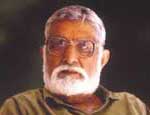Today afternoon when I got up from sleep, the clock was showing two thirty. I usually rise bit late after working whole night in the office. But today I don’t know why I got up early. I started surfing the TV channels for next few minutes. In an hour or so, I happened to see an interview of Poornachandra Tejaswi in E-TV. I threw the remote aside and started watching my favourite writer speak. As most of the people know, Tejaswi does not come out and give interviews to media. So it was a delight to see him on TV. I came to know that the interview was a repeat telecast from the archives. Jayanth Kaykini, an exceptional Kannada short story writer interviewed Tejaswi.
In the middle of the interview a flash news appeared: Tejaswi passed away in Mudigere due to heart attack. It came as a shocking news. The person who was shown discussing his life and body of work on TV is not with us anymore. I turned to other Kannada channels; TV9 , Udaya news and Chandana to confirm the news. It was true. Kannada writers, politicians and eminent personalities expressed their sadness on TV. Everyone shared a thought that Tejaswi’s death is a big loss to Kannada literature. It was strange that my wall clock had stopped working at 2:30 pm, exactly the time of his death, perhaps indicating the end of an era.
He has always been my favorite writer. I remember my school days, when I read his book about UFOs. I was so fascinated by his writing that it made me read more books about extra terrestrial, space science and astronomy. His book ‘Karvalo’ is my all time favorite. The vivid picture of Western Ghats that he paints in this novel is beautiful. His novel ‘Jugari cross’ is a superb thriller depicting the invisible chains of underworld mafia surrounding the tranquil forest area of Western Ghats. ‘Chidambara Rahasya’ is another enjoyable novel that deals with many social issues of that region.
Tejaswi’s short stories became a bench mark for the future writers in Kannada. ‘Abachurina post office’, ‘ Tabarana kathe’ ‘Kirigoorina gayyaligalu’ and ‘ Kubi maththu iyaala’ are milestones in the Kannada literary field. I remember a Kannada lecturer of mine, who while explaining the character of Tabara from one of Tejaswi’s short stories could not resist himself from shedding tears. That is the depth of characterization in his stories. Some of his works were adapted for cinema and received critical acclaim.
His love for nature is very evident in his works. Whether it is bird-photography or his writings on wild life, we can see his extensive research and decades of experience. He loved the silent life the jungles of Western Ghats offered. As he rightly said in his interview, jungle becomes alive when we surrender to it by our silence. We should also remember that his father Kuvempu was also a nature lover. His epic novels and poetry talked about nature in great lengths. While in his writings we see jungle as a divine entities, sort of protecting human beings, his son’s writing was more pragmatic.Tejaswi sensed that these jungles are in the need of protection by man and not vice versa.
Tejaswi’s writings on jungle and wildlife is more than just an observation at the greenery. With an integral scientific temper and a sense of inquiry his writings goes beyond the boundaries of superficial observations. It touches the most fundamental issues of life and gives us a whole new perspective to appreciate nature. Because of the richness and style of his writing, his non-fiction works too carry the beauty of fiction narrative. Other than writing, Tejaswi experimented in many fields such as painting, Sitar, agriculture, ornithology, photography and studies and activities related to environment. He has told many a times that he is a better painter than a writer and his writings made him more popular.
I always wanted to meet Tejaswi and tell him how beautifully he has created an entire universe for millions of Kannada readers like me. I wanted to thank him for providing us a window to the world of international literature, history, science and wildlife in the days when internet was a thing we never heard.
I know my dream of meeting my favorite writer will never come true. As it is true to any good writer, his thoughts and ideas will remain immortal in his writings and we can see him in his books. I request all those who can read Kannada language to pick up some of his books to see what he means to thousands of people like me.
